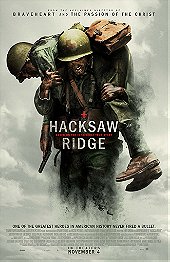Desmond Doss’ story is unique, and deserves to be told for the bravery and emotional commitment to his deeply held beliefs. However, Mel Gibson, an actor/director who practically licks his lips and pleasures himself to mosaics of carnage, is not the right voice to bring that material to life. Hacksaw Ridge is a mess, a film that all but pins a permanent halo around Andrew Garfield’s adorable face while gleefully taking pleasure in its scenes of violence. Call it pious gore porn for the fundamentalist Christian set.
The same brigade of Academy voters who ushered in large nomination scores for American Sniper and Bridge of Spies, both sleepy, tedious films that conservative dad and/or uncle types love, dropped six nominations into this film’s lap. I get the sound awards, maybe even the editing, but this is one of the best-directed movies of the year? This is one of the best pictures of 2016?
I can’t entirely begrudge Andrew Garfield’s nomination since he has to make this thing work, and he tries his best. He never condescends to the character; in fact, he invests Doss with a sense of religious purpose and truth. Garfield’s innately sweet face brings sincerity to any character that he plays, but it feels awkward that this would be his career-first nomination. He was so tremendous in The Social Network, wonderfully doomed in Red Riding: 1974, part of a terrific trio of delicate performances in Never Let Me Go, and won a BAFTA for Boy A. It was just a matter of time before AMPAS finally bestowed him with a nomination, but it is a shame that it took him talking like Huckleberry Hound in a disingenuous piece of gore porn to finally get one.
The film’s failure to engage with the material in any meaningful way is present from the earliest scenes, in this case flashbacks to the abusive childhood Doss endured. These scarring childhood episodes are presented in all the creamy tones of a Norman Rockwell painting. We don’t see Doss question or engage with his father’s drunken antics, his mother’s ridiculous piety, and his family’s religious zealotry in any thoughtful way. There’s no depth, just a vague sense of our hero as a Messiah-in-training.
Then the film switches to the titular location, and out comes Gibson’s lascivious treatment of violence. Here’s a film extolling the virtues of a conscientious objector while furiously masturbating to images of soldiers having their brains shot out, getting blown up, set aflame. The bloodlust is strong, strong enough to make me recoil in deep discomfort as it parallels these images with Doss in Christ-like imagery and baptismal symbolism.
I wonder if another director would have questioned whether or not Doss’ deep religious beliefs and patriotism are compatible, and how they are instead of just paying lip service to all of it. Even worse is just how terrible some of the dialog is. It dumps its themes and ideas in all caps letters, practically bolded above the heads of the characters. At least cinematography of Simon Duggan keeps unfurling a series of beautiful images to distract you from the stupidity of what’s falling out of the characters mouths. There’s a better movie to be made out of the parts of Hacksaw Ridge, but Gibson isn’t the director to bring it to the screen. The darker and more interesting questions and implications seem out of his reach, and this leaves it slightly inept. It’s more interesting to talk about Doss and his true story then it is to talk about the film made out of his life.
 Login
Login